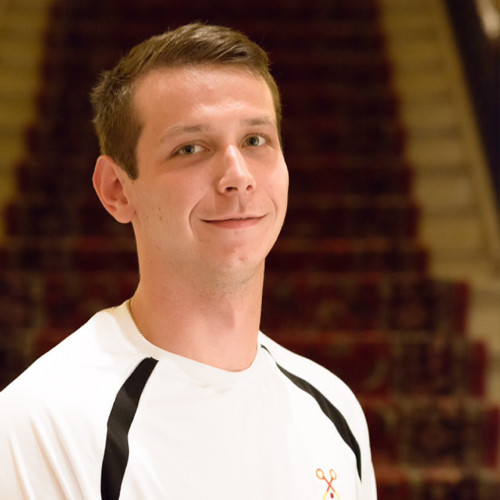
A call to coaching
Philadelphia Racquet Club Head Squash Pro James Asher has retired and turned to coaching.
By Mike Cornaglia
James Asher has played squash since he was a teenager back in England, but the physicality of the game made his body tell him it was time to hang up the racquet.
Asher is currently the Head Squash Pro at the Philadelphia Racquet Club, but Mother Nature is the reason he accidentally found the game.
“My dad back in England, it was a rainy day,” Asher recalled. “I was going to play futbol and the match got canceled. The club I was at was £100 a year. He paid $1 for a court.”
Asher didn’t take the game seriously at first, and it took him some time to get a feel for it.
“At the start it was all about beating my brother,” he said when talking about his early days playing the game.
The longtime pro described the game as “very tactical, but it’s also a physical game,” he said. “It’s the stamina, and then you have to have the mental strength with it being an individual game.”
Asher, now 30, came to America not long after turning pro. He was a highly touted individual with many clubs wanting his services.
“My squash coach was a pro at Merion Cricket Club,” he said. “He spoke to my boss here, and [he] was looking for a young guy to come over. I was 20 years old.”
“For me, I enjoyed it. It was fun. Individual sports are different to group sports where everything rides on you, I love that part of the game,” Asher added.
While squash is the career path Asher is on, he saw a different path when he was younger.
Coaching was always a passion for Asher. He even decided to pursue an education in the field.
“I went to university for Coaching Development,” he said. “I always liked coaching, I like the biomechanics of other sports. For me, I was always going to get into coaching at some stage.”
After a lengthy playing career, Asher has called it a career on the court and will stick to the sidelines.
Athletes often enter the prime of their careers in their late 20s to early 30
For Asher, that was his limit.
“I played my last match a month ago, but now I’m game over,” he said.
Asher believes his path from playing to coaching is a common one. He credits America for giving players the opportunity to have a lengthy career.
“A lot of these kids now coming over here for college, you have a shelf life for every game, whether it’s 35, 30, 37,” Asher said. “Whatever it is, you have to have a backup plan for the end.”
Asher attributes an early expiration date in the game to the physicality the game requires.
“It’s very rare to play into your 40s,” he said. “So many knee injuries, hips, backs. It’s not a game you can play forever.”
That physicality caught up to Asher. His final match was also his first in almost a decade.
“That match I played last month was my first in seven or eight years. I’ve had three knee surgeries, two herniated discs in my back. I have no interest in playing the game,” he said.
Athletes of any type have a shelf life. Asher’s was shorter than most. Injuries continuing to pile up caused him to lose interest in playing the game full-time.
Coaching was the most feasible option to continue a career in a game that he found on a happy accident.


